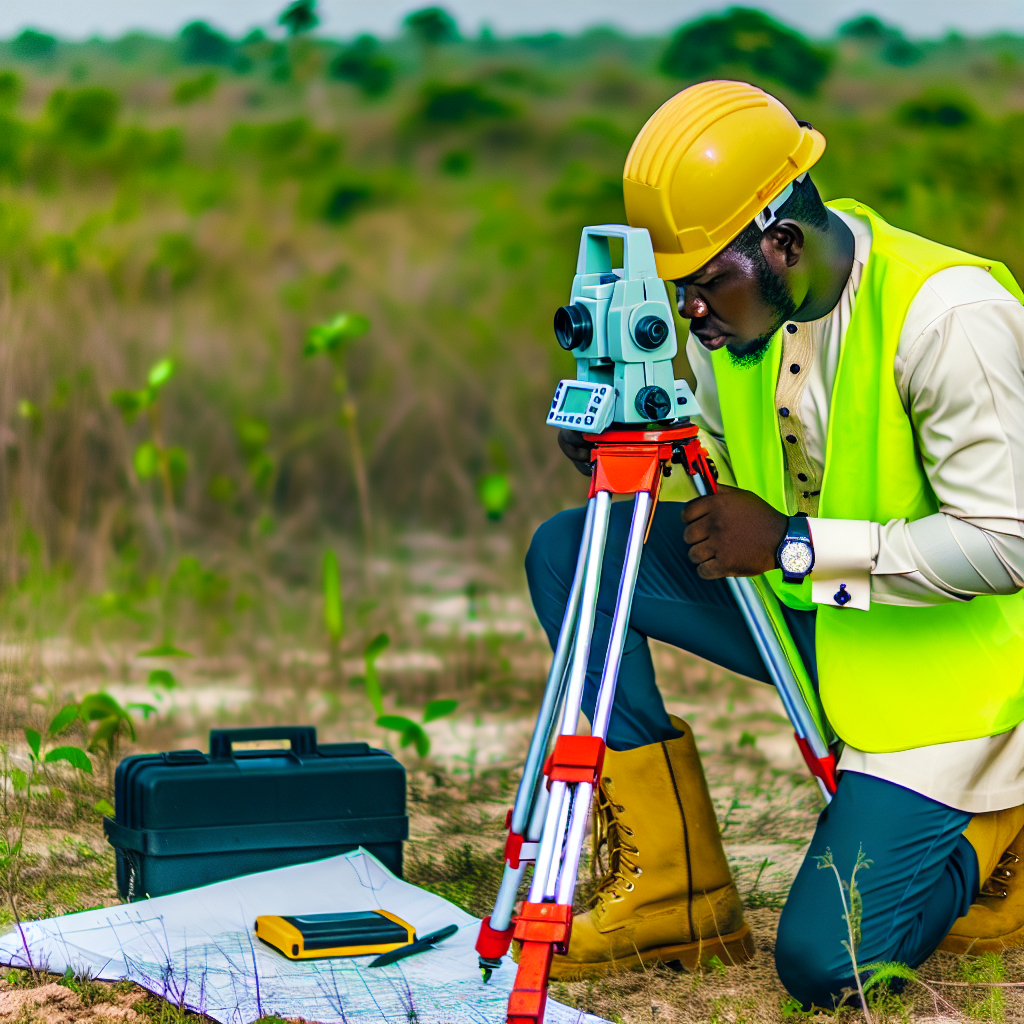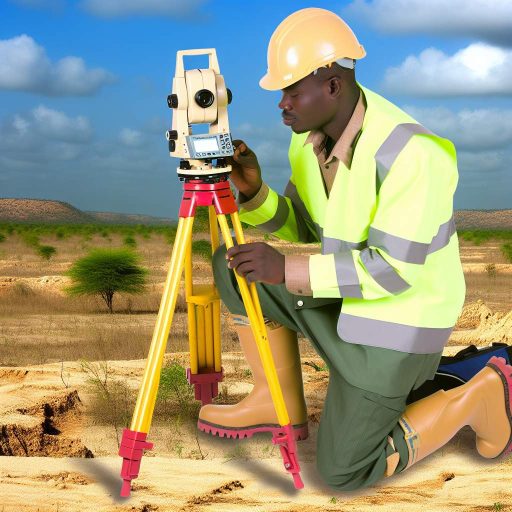Introduction
Land surveying involves measuring and mapping the land for property boundaries and development.
Environmental management focuses on preserving natural resources and minimizing human impact on the environment.
These disciplines are crucial in Nigeria due to rapid urbanization and industrialization.
Land surveying ensures proper land use planning and helps prevent land disputes in the country.
Environmental management is essential for maintaining biodiversity and ecological balance in Nigeria.
Both disciplines play a significant role in sustainable development and ensuring a healthy environment.
The Contribution of Land Surveyors to Environmental Planning and Monitoring
Land surveyors play a crucial role in environmental management by providing essential data and insights for effective planning and monitoring.
Identifying Critical Areas:
Land surveyors help identify environmentally sensitive areas that need to be protected or conserved, such as wetlands, forests, or endangered species habitats.
Designing Infrastructure Projects:
Surveyors ensure that infrastructure projects are designed in a way that minimizes environmental impact, such as avoiding areas prone to erosion or flooding.
Monitoring Land Use Changes:
Through regular surveys, land surveyors track changes in land use patterns, such as deforestation or urban sprawl, to assess their impact on the environment.
The Need for Accurate Land Surveys in Environmental Impact Assessments
Ensuring Compliance with Regulations:
Accurate land surveys are essential for conducting environmental impact assessments (EIAs) to ensure that projects comply with environmental regulations.
Quantifying Environmental Impacts:
Survey data is used to quantify the potential environmental impacts of a project, such as changes in water quality, soil erosion, or wildlife disturbance.
Developing Mitigation Strategies:
Based on survey findings, land surveyors can help develop mitigation strategies to minimize or offset the negative environmental effects of a project.
Stakeholder Engagement:
Accurate surveys provide stakeholders with transparent and reliable information about the environmental implications of a project, fostering better decision-making.
Implications of Land Surveying for Environmental Sustainability
In summary, land surveyors play a vital role in environmental management by providing critical data and insights for planning, monitoring, and assessing the impact of human activities on the environment.
Through accurate surveys and assessments, they help ensure that development projects are carried out in a sustainable and environmentally responsible manner.
Role of Land Surveying in Environmental Management
Land surveying plays a crucial role in environmental management.
It provides accurate data for planning and decision-making.
To carry out land surveying effectively, surveyors utilize a variety of tools and techniques.
These tools help in assessing the impact of human activities on the environment.
They also assist in developing strategies for sustainable land use.
This section explores the technology and equipment used by land surveyors.
We will discuss the importance of GIS and GPS in environmental management.
Tools Used in Land Surveying for Environmental Management
- Total Station: Total stations are electronic devices.
- They measure angles and distances with high accuracy.
- They combine the functions of a theodolite and electronic distance meter.
- This allows surveyors to determine coordinates and create detailed maps.
- GNSS Receivers: Global Navigation Satellite System receivers collect precise positioning data.
- They enable surveyors to accurately determine location on the Earth’s surface.
- Drones: Unmanned Aerial Vehicles are used for environmental management.
- Drones capture high-resolution aerial images and create 3D models of landscapes.
- LiDAR: Light Detection and Ranging technology uses laser pulses.
- LiDAR creates detailed maps of terrain, vegetation, and structures.
Techniques Used in Land Surveying for Environmental Management
- Ground Truthing: This involves verifying data collected from remote sensing technologies.
- It helps ensure the accuracy of mapping data.
- Remote Sensing: Techniques such as satellite imagery are used for gathering information.
- Surveyors analyze these images to monitor land cover changes.
- Geographic Information System (GIS): GIS stores, analyzes, and visualizes spatial data.
- This helps in identifying patterns and trends contributing to effective management.
- Global Positioning System (GPS): GPS provides accurate location data for mapping.
- Surveyors use GPS to track changes in the landscape and monitor wildlife habitats.
Importance of GIS and GPS in Environmental Management
- Enhanced Data Analysis: GIS enables integration of various data types into a single platform.
- This helps in identifying environmental risks and assessing impacts.
- Real-Time Monitoring: GPS allows surveyors to track environmental changes in real-time.
- Timely interventions can protect natural resources and biodiversity.
- Conservation Planning: GIS and GPS help develop conservation plans prioritizing sensitive ecosystems.
- These tools create sustainable management strategies to mitigate threats.
- Disaster Management: GIS and GPS provide accurate location data for emergency services.
- They help assess infrastructure damage and coordinate rescue operations.
The tools and techniques in land surveying are essential for understanding landscape dynamics.
They ensure sustainable development practices.
By leveraging technologies like total stations, drones, LiDAR, GIS, and GPS, surveyors collect accurate data.
They analyze environmental trends and make informed decisions.
Such efforts protect the environment for future generations.
Innovative approaches in land surveying benefit the conservation of natural resources.
These practices contribute to the overall well-being of our planet.
Delve into the Subject: How to Become a Biomedical Engineer in Nigeria
Common Challenges Faced by Land Surveyors in Environmental Management in Nigeria
Land surveyors in Nigeria face several challenges in their efforts to manage and protect the environment.
These challenges often hinder their ability to effectively carry out their duties and contribute to environmental conservation.
Transform Your Career with Expert Guidance
Get personalized mentorship consulting that’s tailored to your unique path. Our expert advice is actionable and exclusive.
Get StartedSome of the common obstacles they encounter include:
Land Disputes
One of the major challenges faced by land surveyors in Nigeria is the prevalence of land disputes.
These disputes often arise due to unclear boundaries, conflicting land ownership claims, and overlapping survey reports.
As a result, surveyors face difficulties in accurately delineating land parcels and conducting surveys in disputed areas.
This can impede environmental management efforts.
Inadequate Infrastructure
Another significant challenge for land surveyors in Nigeria is the lack of adequate infrastructure.
Poor road networks, limited access to remote areas, and inadequate surveying equipment hinder their ability to conduct surveys efficiently.
This lack of infrastructure can delay survey projects, disrupt data collection processes, and limit the accuracy of survey results.
This ultimately affects environmental management initiatives.
Lack of Regulations
The absence of clear regulatory frameworks and guidelines for land surveying in Nigeria poses a challenge for surveyors.
The lack of standardized procedures, licensing requirements, and enforcement mechanisms can lead to inconsistencies in survey practices and data interpretation.
This regulatory vacuum creates uncertainties in land surveying processes, making it difficult for surveyors to adhere to best practices.
They also struggle to comply with environmental management regulations.
Impact of These Challenges on Environmental Conservation Efforts
The challenges faced by land surveyors in Nigeria have a significant impact on environmental conservation efforts in the country.
These obstacles not only impede the accurate mapping and monitoring of natural resources but also hamper the implementation of sustainable land use practices.
The following are some of the impacts of these challenges on environmental conservation:
Inaccurate Data Collection
The presence of land disputes and inadequate infrastructure hinders the collection of accurate and reliable data essential for environmental management.
Inaccurate survey reports, incomplete mapping data, and unreliable survey findings can compromise conservation efforts.
This leads to ineffective land use planning and natural resource management.
Legal and Regulatory Compliance Issues
The lack of clear regulations and guidelines for land surveying in Nigeria can result in legal and regulatory compliance issues for surveyors.
Without standardized procedures and licensing requirements, surveyors may face challenges in obtaining approvals for survey projects.
They struggle to adhere to environmental protection regulations and comply with land use planning policies.
This lack of regulatory framework can create loopholes for illegal land activities and environmental degradation.
Delayed Environmental Impact Assessments
The challenges faced by land surveyors, such as land disputes and inadequate infrastructure, can delay environmental impact assessments.
Delays in conducting surveys, analyzing data, and preparing reports can slow down the environmental assessment process.
This impedes effective decision-making on conservation measures.
The delay in assessment procedures can lead to increased environmental risks, habitat destruction, and loss of biodiversity in Nigeria.
Limited Stakeholder Engagement
The obstacles encountered by land surveyors in Nigeria also impact stakeholder engagement in environmental management initiatives.
Land disputes, lack of regulations, and inadequate infrastructure can hinder effective communication and collaboration.
This affects local communities, government agencies, and conservation organizations.
Limited stakeholder engagement can undermine consensus-building efforts and community participation.
This ultimately affects the success of environmental conservation projects.
You Might Also Like: Innovative Surveying Methods for Nigerian Landscapes
Land surveying plays a crucial role in environmental management by providing valuable data and information for sustainable practices.
Principles of Sustainable Land Surveying
- Utilization of advanced technology for precision and accuracy.
- Minimization of environmental impact during surveying activities.
- Integration of ecological considerations into land surveying processes.
- Promotion of biodiversity conservation and habitat preservation.
- Adoption of efficient land use planning to minimize land degradation.
Sustainable land surveying practices aim to balance the needs of development with environmental protection by following these principles.
Contribution to Environmental Protection
- Identification of environmentally sensitive areas for preservation.
- Monitoring of land changes to detect potential environmental risks.
- Assessment of land use impacts on water quality and air pollution.
- Support for sustainable resource management and conservation efforts.
- Reduction of carbon footprint through eco-friendly surveying methods.
By adhering to sustainable practices, land surveyors play a key role in safeguarding ecosystems and promoting environmental sustainability.
Importance of Eco-Friendly Practices
- Reduction of greenhouse gas emissions during surveying activities.
- Preservation of natural habitats and wildlife through responsible surveying.
- Enhancement of public health by minimizing exposure to harmful chemicals.
- Promotion of clean energy solutions in surveying operations.
- Compliance with environmental regulations and standards for project approvals.
Implementing eco-friendly practices not only benefits the environment but also enhances the overall quality of land surveying projects.
Sustainable land surveying practices are essential for environmental management and protection.
By embracing eco-friendly methods and principles, land surveyors can contribute to a healthier and more sustainable future for our planet.
Find Out More: Collaboration Opportunities in Nigerian Biomedical Engineering

Collaboration between Land Surveyors and Environmental Management Experts
Interdisciplinary collaboration between land surveyors and environmental management experts brings about numerous benefits.
This leads to more effective and sustainable solutions for environmental challenges.
Benefits of Interdisciplinary Collaboration
- Enhanced data collection and analysis: By combining expertise in land surveying and environmental management, teams can collect comprehensive data and analyze it from multiple perspectives.
- Improved decision-making: Collaborative efforts promote a more holistic approach to problem-solving. This leads to better decisions that consider both environmental and land use factors.
- Innovative solutions: Working together allows for the development of innovative solutions that leverage the strengths of each discipline. This leads to more effective strategies for environmental management.
- Cost-effectiveness: By sharing resources and expertise, interdisciplinary teams can reduce costs associated with data collection, analysis, and implementation. This ultimately enhances project efficiency.
- Enhanced stakeholder engagement: Collaboration fosters better communication among stakeholders. This ensures that diverse perspectives are taken into account, leading to greater support for environmental initiatives.
- Long-term sustainability: By considering both land surveying and environmental management principles, collaborative projects are more likely to be sustainable in the long run. This benefits both the environment and society.
Case Studies of Successful Environmental Management Projects
Several case studies demonstrate the positive impact of collaboration between land surveyors and environmental management experts.
- Urban Redevelopment Project: In a city redevelopment project, surveyors collaborated with environmental scientists to assess contaminated sites. They developed remediation strategies and planned sustainable land use. This led to the revitalization of urban areas.
- Wetland Restoration Initiative: Through joint efforts, surveyors mapped wetland areas. Environmental experts provided guidance on habitat restoration and conservation measures. This resulted in the preservation of critical ecosystems.
- Infrastructure Development: By working together, surveyors and environmental professionals incorporated green infrastructure practices into road construction projects. This reduced environmental impact and promoted sustainable transportation solutions.
- Land Use Planning: Collaboration between surveyors and environmental management experts in land use planning projects helped identify suitable locations for development. This ensured the protection of sensitive habitats, leading to balanced and sustainable growth.
- Disaster Risk Reduction: Through joint assessments, surveyors and environmental scientists identified areas vulnerable to natural disasters. This allowed for proactive mitigation measures to be implemented, reducing risks and enhancing community resilience.
The collaboration between land surveyors and environmental management experts is essential. It addresses complex environmental challenges and achieves sustainable outcomes that benefit both the environment and society.
You Might Also Like: Impact of Climate Change on Land Surveying Practices
Importance of Land Surveying and Environmental Management
Land surveying and environmental management play crucial roles in sustainable development.
The accurate mapping and assessment of land resources are essential for effective environmental conservation efforts.
Integration of these disciplines is vital for ensuring that development projects are environmentally sustainable in Nigeria.
By supporting and promoting collaboration between land surveyors and environmental managers, we can achieve better outcomes for both the environment and society.
All stakeholders, including government bodies, developers, and communities, must recognize the significance of land surveying in environmental management.
Through collaboration and proper planning, we can ensure that our natural resources are preserved for future generations.
Let us all work together to promote the integration of land surveying and environmental management for effective environmental conservation efforts.
Only through collective efforts can we achieve sustainable development and ensure a healthier and greener future for Nigeria.
Additional Resources
List of Journal Abbreviations This list is based mostly on ISO 4:1997 …
A survey of site management practice on some selected sites in …




